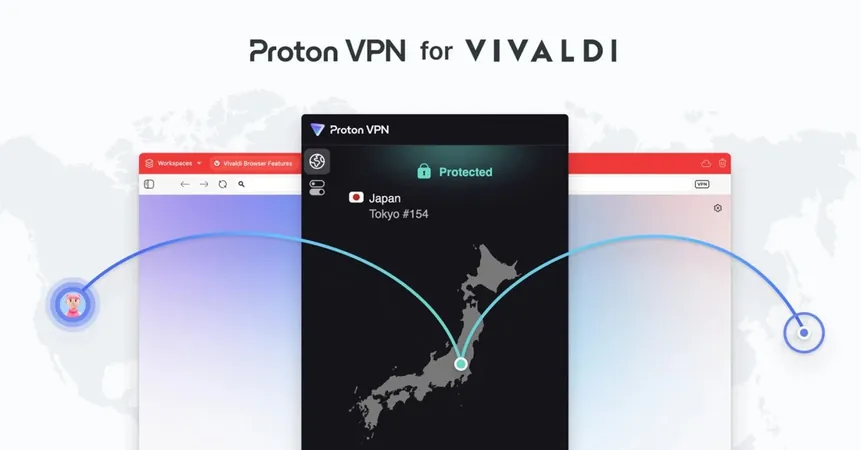
Vivaldi Integrates Proton VPN for Enhanced Privacy in Browsing
2025-03-27
Author: Olivia
In a significant move towards bolstering online privacy, Vivaldi has announced a partnership with Proton to integrate Proton VPN directly into its web browser. This feature will enable Vivaldi users to surf the web privately and securely without the need to download an external virtual private network application. Effective immediately, this functionality is accessible to users who log into a Vivaldi account and is currently available exclusively on the desktop version of the Vivaldi browser.
The integration introduces a free version of Proton VPN, which allows users to connect to servers in five randomly selected countries. While this offers "medium VPN speed," users seeking greater performance and control can upgrade to the paid version of Proton VPN, starting at $10 per month. The premium service unlocks faster speeds and the option to connect to servers in over 110 countries, along with a host of additional features tailored for dedicated privacy enthusiasts.
This move is part of a broader trend among web browsers to incorporate VPN services directly. Notably, Microsoft's Edge browser has introduced its own VPN feature known as the Edge Secure Network. However, Vivaldi’s seamless integration of Proton VPN eliminates the need for additional browser extensions, simplifying access for users who may not be familiar with this technology.
Vivaldi's CEO, Jon Von Tetzchner, emphasized that both companies are committed to privacy and independence, stating that their partnership reflects a shared vision that transcends typical Silicon Valley approaches. “As global dynamics shift, there is an increasing demand for solutions that are independent, non-aligned, and grounded in values,” Tetzchner asserted. “Europe needs its own alternatives, and Vivaldi alongside Proton provides just that.”
The partnership also comes at a time when there is a growing apprehension about data privacy and the implications of government oversight in technology, especially in light of rising geopolitical tensions. With this feature, Vivaldi aims to attract users seeking a privacy-centric browser experience outside the influence of major US tech giants. This unique proposition could very well resonate with those looking for a browser that prioritizes their freedom and privacy.
In conclusion, the integration of Proton VPN into the Vivaldi browser is not just a feature enhancement; it symbolizes a concerted effort to carve out a space for European alternatives in the tech landscape while championing user privacy. With more users becoming aware of online surveillance issues, this could be the game-changer that positions Vivaldi as a leader in the fight for a free and secure internet experience.









 Brasil (PT)
Brasil (PT)
 Canada (EN)
Canada (EN)
 Chile (ES)
Chile (ES)
 Česko (CS)
Česko (CS)
 대한민국 (KO)
대한민국 (KO)
 España (ES)
España (ES)
 France (FR)
France (FR)
 Hong Kong (EN)
Hong Kong (EN)
 Italia (IT)
Italia (IT)
 日本 (JA)
日本 (JA)
 Magyarország (HU)
Magyarország (HU)
 Norge (NO)
Norge (NO)
 Polska (PL)
Polska (PL)
 Schweiz (DE)
Schweiz (DE)
 Singapore (EN)
Singapore (EN)
 Sverige (SV)
Sverige (SV)
 Suomi (FI)
Suomi (FI)
 Türkiye (TR)
Türkiye (TR)
 الإمارات العربية المتحدة (AR)
الإمارات العربية المتحدة (AR)